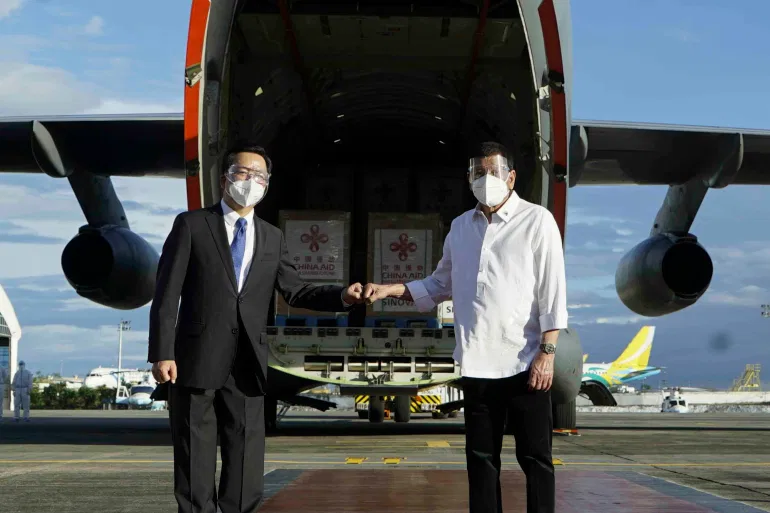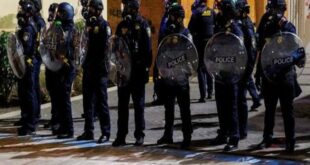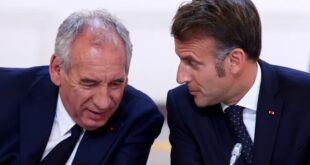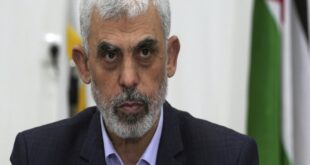
In May last year, at the height of the COVID-19 pandemic, Chinese President Xi Jinping declared that his country would soon provide safe and effective vaccines as a “global public good”, especially to the developing world.
To this end, the Chinese leader launched a massive state-backed campaign, allocating large amounts of subsidies and corralling up to 22 firms and research institutes to work on as many as 17 vaccine projects.
Some leaders in China’s immediate neighbourhood felt reassured by Xi’s rhetoric and hoped to capitalise on good relations with Beijing to acquire vaccines early on. In July, the Philippines’ President Rodrigo Duterte declared that his country would be “back to normal” by December, thanks to Chinese assistance.
Despite big funds and high hopes invested in the Chinese vaccine drive, it has not been the major success it was expected to be, at least in Southeast Asia. Chinese-developed vaccines have been met with significant scepticism in the region due to questions about their distribution, effectiveness and pricing, as well as potential “strings attached”.
As other major powers are catching up with vaccine production and making concrete steps towards provision for developing nations, China’s vaccine diplomacy in Southeast Asia and beyond may soon face formidable challengers.
The ‘Health Silk Road’
Witnessing an uptick in anti-China sentiment shortly after the COVID-19 outbreak, Beijing began presenting itself as an unlikely saviour of humanity, especially for poorer nations with limited ability to contain major public health crises.PUBLICITÉ
After its initial success delivering personal protective equipment and test kits across the world, it took on the task of developing COVID-19 vaccines. Last year, trials of Chinese vaccines were launched in 18 countries in Asia, Africa and Latin America. The Southeast’s largest nation, Indonesia, became a major hub for Chinese clinical trials, involving several Chinese pharmaceutical companies.
Buoyed by the outpouring of gratitude from Europe to Asia, China touted its overseas aid as a new “Health Silk Road”, part of its much-vaunted Belt and Road Initiative (BRI) investments across the world. Chinese officials said participating BRI nations were a top priority for provision of vaccines, both free and subsidised.
A year into the pandemic, China announced that it is providing free vaccines to 69 countries across the developing world and commercially exporting to 28 others.
Apart from helping mend its global image after it was blamed for the COVID-19 outbreak, Beijing’s medical drive also has an important economic aspect. Up until 2019, China played a minimal role in the global pharmaceutical industry, contributing less than 2 percent of medical goods procured by the United Nations.
By contrast, neighbouring India was responsible for 22 percent of such procurement and for 60 percent of global vaccine exports. Now, Chinese COVID-19 vaccines are set to increase the country’s global market share and, according to some estimates, bring more than $10bn in sales.
Delays and concerns about the efficacy and politics of China’s vaccine shipments plague its vaccine drive in the region.
Delays and doubts
As China rolled out its vaccines, Indonesia, the de facto leader of the Association of Southeast Asian Nations (ASEAN), was among the first to receive the Sinovac vaccine. In early December, 1.2 million doses arrived, followed by 1.8 million by the end of the month. In January, Indonesia’s state-owned Bio Farma started producing the Chinese vaccine with materials sent from China.PUBLICITÉ
But in the rest of the region, shipments were delayed and were much smaller. Cambodia and Laos received 600,000 and 300,000 doses respectively in early February, while Thailand got 200,000 doses two weeks later. The Philippines received 600,000 doses at the end of the month – much later than Duterte had hoped.
Although China pledged to provide 300,000 doses to Myanmar, it still has not delivered; instead, the country received its first vaccine shipment of 1.5 million doses from India in January.
Chinese vaccine makers – like their Western counterparts – have suffered serious production delays and lack of capacity. In January, Sinovac production levels reached only half of the intended manufacturing capacity, raising doubts as to whether other, less-established Chinese companies will be in a position to meet demand.
Vaccines exports could also be hampered by China’s need to prioritise the mass vaccination of its one-billion-strong population, a major feat that may not be accomplished until the middle of next year.
An even greater source of concern is the efficacy of Chinese vaccines. International criticism has focused on the Chinese companies’ lack of transparency over results from the final phase of clinical trials. Clinical trials overseas have shown that Sinovac’s efficacy rate may be low as 50.4 percent, well below its competitors, which boast rates as high as 90 percent.
It is quite telling that even the staunchly pro-Beijing Philippine president and his health secretary have not taken a Chinese vaccine. Some medical experts, including a former top government adviser, have openly questioned the government’s reliance on the Chinese jab and demanded that it undergoes another appraisal by the health authorities.PUBLICITÉ
Meanwhile, a recent investigation by the Philippines’ Senate revealed that the country may be paying more for Chinese vaccines than some of its neighbours. Concerns about the politics of Chinese vaccine shipments were also raised as China escalated its aggressive behaviour in the South China Sea in March while sending another shipment.
Neighbouring Vietnam, which like the Philippines has maritime disputes with China, has rejected Chinese-made vaccines altogether.
Some of China’s close allies in the region are also not putting all their eggs in one basket. Cambodia invested first in 1 million doses through the UN-backed COVAX scheme, while Indonesia, Malaysia and Thailand have also been actively diversifying their vaccine supply by reaching out to alternative sources in the US, Europe, India and Russia. As for ethnically Chinese-majority Singapore, it is largely relying on vaccines from established pharmaceutical companies in the West.
Vaccine competition
Over the coming months, China’s initial advantage in vaccine diplomacy will likely disappear, as other major players step up. The Biden administration, for instance, has reversed its predecessor’s “America First” approach by reinstating assistance to the World Health Organization, as well as doubling down on its commitment to support the UN’s COVAX scheme, which aims to provide up to 2 billion doses to the poorest nations.
Together with Australia, India and Japan, the US has recently launched a new initiative under the Quadrilateral Security Dialogue, better known as the “Quad” grouping, for joint production of up to 1 billion doses intended for Southeast Asian nations.
Having come under heavy criticism for their vaccine hoarding in recent months, European countries are also expected to augment their contribution to the COVAX and similar universal vaccine initiatives. Another major vaccine manufacturing rival to China is Russia, which has shown greater transparency in clinical trials of the Sputnik V vaccines and enjoys relatively higher trust.
All of these initiatives will likely challenge China’s ability to leverage vaccine provision in Southeast Asia and beyond. Thus, what initially looked like a resounding Chinese triumph in “vaccine diplomacy” may turn out to be less of a success than Beijing had hoped for.
Richard Javad Heydarian is a specialist in Asian geopolitical and economic affairs.




 World Opinions Débats De Société, Questions, Opinions et Tribunes.. La Voix Des Sans-Voix | Alternative Média
World Opinions Débats De Société, Questions, Opinions et Tribunes.. La Voix Des Sans-Voix | Alternative Média





